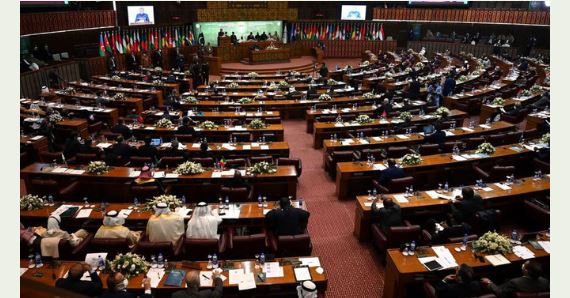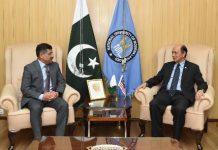ISHTIAQ AHMAD
Named in honor of Islam, Pakistan’s capital, Islamabad, has emerged as a key summitry venue for the Organization of Islamic Cooperation, the largest international organization in the world after the UN.
In December, the city hosted a special session of the OIC’s Council of Foreign Ministers to discuss ways to avert the humanitarian crisis in Afghanistan. This week, the 48th annual session of the CFM also took place in Islamabad. It coincided with celebrations for the 75th anniversary of Pakistan Day.
About 200 delegates from 57 member states, represented mostly by their foreign ministers, spent two days deliberating the theme of the session: Building partnerships for unity, justice and development. On Wednesday, they resolved to act together during the current global divide caused by the war in Ukraine. The CFM approved 140 resolutions covering a range of critical issues facing the Islamic world, including Islamophobia, the humanitarian crisis in Afghanistan, the conflicts in Palestine and Kashmir, and post-pandemic economic recovery.
Since its establishment in 1969, the OIC has served as a major platform for sustained interaction among leaders and officials from the Islamic world by holding a summit of the leaders of member states once every three years, an annual CFM conference, and regular meetings of officials from almost two dozen subsidiary and affiliated institutions and committees.
Pakistan previously hosted the second OIC summit in 1974, the second extraordinary OIC summit in 1997, and the CFM meetings in 1970, 1980, 1993 and 2007.
This week’s CFM session, chaired by OIC Secretary-General Hissein Brahim Taha, was significant in terms of both outcome and attendance. The presence, for the first time, of a Chinese foreign minister, Wang Yi, suggests that Beijing wants to strengthen its relations with the Islamic world. This was apparent as he highlighted the fact that China had signed cooperation agreements with 54 Muslim countries and launched nearly 600 large-scale projects, worth $400 billion, under its Belt and Road Initiative.
“This is a fine example of how to practice the new type of international relations and it also provides useful experience on how different countries and civilizations can interact with each other,” he said.
China’s BRI spans Muslim countries across Asia and Africa. Via an economic corridor through Pakistan that ends at the Indian ocean, China seeks to link its western region with the Arabian Gulf, from where it receives much of its imported oil. In an increasingly multipolar world, the OIC-China relationship will help to diversify economic opportunities for Muslim countries, especially in terms of integration with the BRI’s trade and development network.
China’s participation in the CFM conference also seems to have influenced its resolutions on Ukraine and Kashmir. Regarding the former, the Chinese foreign minister stated: “We need to prevent humanitarian disasters and prevent the spillover of the Ukrainian crisis from affecting or harming the legitimate rights and interests of other regions and countries.”
The CFM resolved to urge Russia and Ukraine to resolve the conflict through dialogue and to establish humanitarian corridors for the safe movement of civilians and aid supplies.
India’s annexation and division of the disputed region of Jammu and Kashmir in 2019 has worsened the security and humanitarian situation for the Muslim Kashmiri population. Pakistan, which is party to the Kashmir conflict under UN Security Council resolutions, has consequently sought the intervention of the OIC’s Contact Group on Kashmir, which met on the sidelines of the CFM session.
Institutional limitations do hinder its peace and reconciliation efforts but the OIC remains the largest representative body for nearly 2 billion Muslims in the world.
Ishtiaq Ahmad
The Chinese foreign minister also weighed in, stating: “On the Kashmir issue, we have once again heard the call of many Islamic friends. China shares the same aspiration.”
The CFM has adopted a resolution on the threats to peace and security in South Asia, but has gone a step further by approving an action plan for members of the contact group to monitor human rights violations in Jammu and Kashmir and coordinate a concerted response to rectify the situation.
The humanitarian crisis in Afghanistan is another issue over which the CFM has taken concrete steps. It has operationalized the Humanitarian Trust Fund for Afghanistan, which was established during its extraordinary meeting in December. Since then, the UN has been able to muster considerable financial support for Afghan relief efforts.
Now, the war in Ukraine threatens to distract global attention from Afghanistan, while the US-led West and the Taliban regime remain divided on financial and humanitarian issues. Hence, the CFM has acted pragmatically by deciding to operationalize its humanitarian engagement in Afghanistan.
Islamophobia is another issue on which the OIC has achieved a considerable global consensus, especially after the OIC group at the UN Human Rights Council secured a resolution in 2011 for an action plan to combat Islamophobia, called the Istanbul Process.
This month, the UN General Assembly also passed a unanimous resolution to declare March 15 the International Day to Combat Islamophobia. The OIC previously instituted an Observatory on Islamophobia and sponsored interfaith harmony and dialogue among populations at the global level. The CFM’s decision to appoint a special envoy on Islamophobia takes this progressive journey a step further.
Of course, since the OIC was created under Saudi leadership in response to the 1969 Israeli attack on Al-Aqsa Mosque in occupied Jerusalem, no OIC meeting can conclude without a forthright resolution on Palestine.
The CFM reiterated the Islamic world’s call for an Israeli withdrawal from all occupied territories and the establishment of a separate Palestinian state under the Arab Peace Initiative which was proposed by Saudi Arabia in 2002 and endorsed by the Arab League. It also reaffirmed moral and diplomatic support for suffering Muslim communities, such as the Rohingya of Myanmar, and underscored the urgency of resolving intra-Muslim conflicts, such as the war in Syria.
Yemen is one such unfortunate conflict zone, where the Iranian-backed Houthi militia has not only held the Yemeni population hostage to its militarism but also brazenly attacked Saudi Arabia with increasing intensity. Therefore, during his address Saudi Foreign Minister Prince Faisal bin Farhan urged OIC member states “to apply more pressure on the Houthis so that they can be stopped from jeopardizing the security of the Kingdom.” The CFM responded by resolving to take the appropriate measures in this regard.
Like other multilateral institutions, the OIC might lack the enforcement mechanisms for implementing its resolutions in non-Muslim countries but on issues such as the situation in Yemen, OIC members do have the ability to put pressure on recalcitrant states, such as Iran. In this respect, the CFM has agreed to convene a ministerial meeting to identify mechanisms and tools for the promotion of peace and the prevention of conflicts in the Islamic world.
Through its affiliated and subsidiary bodies, such as the Islamic Development Bank, the OIC has always tried to deal with issues of poverty, health, education, disaster management and climate change. The CFM also resolved to facilitate the post-pandemic economic recovery through increased cooperation in the trade and energy spheres, which will help member states to achieve incremental progress in a gamut of developmental issues that are included in the UN Sustainable Development Goals.
Forging unity among Muslims, defending Muslim causes in world politics, and resolving internal differences within the Muslim world are the founding ideals of OIC. Its efforts in the past couple of decades to resolve conflicts and protect their civilian victims, as well as to combat global challenges, such as Islamophobia, offer a glimmer of hope.
Institutional limitations do hinder its peace and reconciliation efforts but the OIC remains the largest representative body for nearly 2 billion Muslims in the world, along with their expectations for progress and prosperity.
• Ishtiaq Ahmad is a former journalist who has been vice chancellor of Sargodha University in Pakistan and Quaid-e-Azam Fellow at the University of Oxford.

















